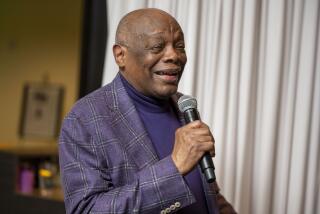Brown Has a Knack for Unity : Appointee: First black named to Cabinet is known for ability, personal warmth. But he is not free of controversy.
- Share via
WASHINGTON — Ronald H. Brown is the first black named to the Cabinet by a President-elect who promises his appointments will reflect America’s diverse makeup. But focusing on Brown’s race obscures a central point.
He has proven himself a master-builder of consensus wrung from disharmony, a figure whose glass-is-half-full optimism could spur the promotion of exports and development of technology that President-elect Bill Clinton promises to bring about.
Brown’s outgoing warmth and articulate speech--he is often smiling and never seems to have to grasp for the right word--helped him manage Sen. Edward M. Kennedy’s successful 1980 California primary campaign against President Jimmy Carter and to defuse a Jesse Jackson-Michael S. Dukakis clash at the 1988 Democratic National Convention.
Yet, his abilities aside, Brown seems likely to face tough questioning before he is confirmed. At the press conference Saturday, Brown brushed aside questions about his work representing controversial clients and suggestions that he makes money off of party ties.
Brown, 51, was born in Washington, where both his parents graduated from Howard University. He grew up in New York, where his father managed a famous Harlem hotel that catered to such elite as Louis Armstrong, Joe Louis and Jackie Robinson.
His father stressed education, and Brown’s formative years saw him often the “first” or “only” black to achieve many goals or positions. Brown attended a special elementary school run by Hunter College for New York’s brightest. Then it was on to private prep schools and then Middlebury College in Vermont.
He served four years in the Army, including tours in Germany and Korea. But it was America where he was treated as less than a full citizen.
As a new second lieutenant in 1963, Brown and his wife, Alma, headed for Ft. Eustis in Virginia and pulled off the road for a drive-in meal. It was the year before enactment of the Civil Rights Act of 1964 with its public accommodations protection, and they were refused service.
The young couple skipped eating until they reached the Army base. For the next year, whenever they ate off base, they limited themselves to restaurants for blacks.
After Army service, Brown worked days for the National Urban League and studied law nights at St. John’s University. In 1973, at the urging of Vernon E. Jordan Jr., then head of the Urban League, Brown moved to Washington to head the moderate civil rights organization’s office and serve as spokesman.
Tired of being “an expert on all things black,” Brown joined Kennedy’s abortive 1980 campaign.
In 1981, he moved into the powerhouse lobbying and law firm of Patton, Boggs & Blow, where he tripled his Capitol Hill salary of roughly $65,000 to about $200,000 annually.
After joining the firm, Brown told an interviewer that his work on the Hill had helped enlist as a client the Home Recording Rights Coalition, a group of electronics and recording equipment makers that included 11 Japanese subsidiaries.
Among other clients, Brown represented Jean Claude (Baby Doc) Duvalier’s Republic of Haiti--from October, 1982, until about February, 1986--when Duvalier was forced to flee the country.
Brown defended his work for Haiti, saying his client was the country and not the Duvaliers.
In a study last September of conflict of interest issues involving national party chairmen, Brown drew special criticism.
“No chairman appears to have had more outside business activities,” said the Center for Public Integrity, a nonprofit group that examines public service and ethics-related issues.
Asked whether he or Clinton were concerned about conflict questions that could be raised at his confirmation hearing, Brown said: “I don’t think there are going to be any questions. I obviously will do everything that is proper and ethical in my role as secretary of commerce.”
More to Read
Get the L.A. Times Politics newsletter
Deeply reported insights into legislation, politics and policy from Sacramento, Washington and beyond. In your inbox twice per week.
You may occasionally receive promotional content from the Los Angeles Times.










